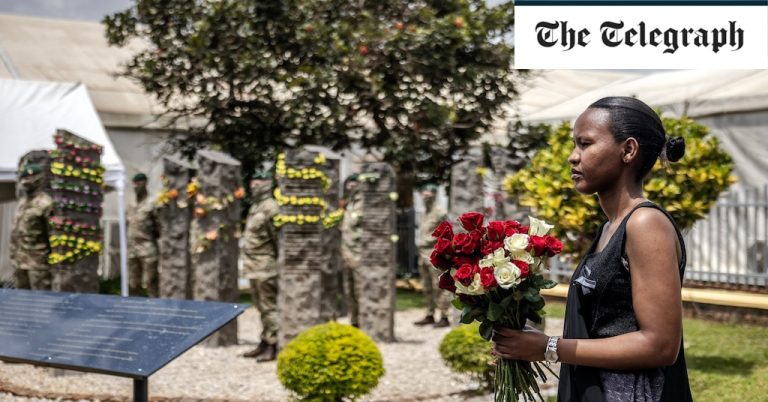On May 25, 2020, I was at home in Omaha, Nebraska, participating in a video call with the World Health Organization on Covid-19 when I started seeing videos on social media channels. Three white policemen knelt on one black man. One officer pressed his knee into the black man’s neck. Then his last words, “I can’t breathe.”
As an Ethiopian-American woman, I’m grateful for the opportunities I’ve been given in the US. America is where I studied and got my greatest opportunities, a job in public health that I’m passionate about and a loving family. However, George Floyd’s murder was a tipping point and as a mother of four adolescent black children, I became increasingly worried about their safety. Combined with the worst pandemic in a century, and endless zoom calls, I began to yearn for a change.
I wanted to return to the focus of my work; Africa. After a discussion with my husband and children, we decided on Rwanda where we’d been on a holiday the year before. While many who have not visited Rwanda understandably associate it with one of the worst genocides in history, it wasn’t until we moved that I really began to understand the promise and potential of the country.
In 1994, President Nelson Mandela came to power heralding an end to apartheid in South Africa. That same year, Rwanda saw one of the bloodiest episodes of the twentieth century. Over a 100-day period, more than one million Tutsis, as well as Hutus opposed to the extremist Hutu Power government, were killed.
At the time, I was a first-year law student only nascently aware of the tragedy unfolding. I now know that while Belgium had historically colonised and mistreated Rwanda, the great powers of the day, including France, the UK and the US – as well as the United Nations – did nowhere near enough to curtail the killings.
Thirty years on, scars have faded but not disappeared. Reconciliation does not mean forgetting and when 119 bodies were found in the South of the country earlier this year – the pain returns.
I don’t worry about my children in Rwanda
The president of Rwanda is Paul Kagame. Some see him as a strongman and autocrat, but his record on developmental gains including poverty reduction is hard to argue with.
Economically, Rwanda invested in infrastructure, tourism and a burgeoning service industry. While it’s clichéd to talk about the gorillas (which are majestic), the lakes, mountains and safaris match any in the world for beauty and adventure. To ensure food security, Rwanda modernised its farming sector and for the future, it invested in technology and communications. The percentage of Rwandans living in poverty has dropped from 75 per cent at the turn of the Millennium to 40 per cent now according the World Bank. Still much to do, but the investment is paying off.
In Rwanda, I don’t worry about my son going out on a late-night walk or my daughter roaming the neighborhood on her scooter. Education is prioritised, Kigali is one of the cleanest cities I’ve ever been to, plastic bags were banned in 2008 and reforestation projects are rolling out to help mitigate the climate crisis.
As a clinician and a public health advocate, I have long worked on gender equality and to ensure people in lower-income countries can access quality health services. Rwanda is a pioneer of both, women comprise more than 60 per cent of the parliament, and it is one of the first lower-income countries to implement a health for all scheme, called the Mutuelles de santé, which reaches 90 per cent of people. With a GDP of $966 per capita, Rwanda has instituted a universal healthcare program that the US (with a GDP per capita of $76,000) has been unable to do.
And the pandemic reinforced Rwanda’s progress on health. In early 2021, when vaccines came online, the government took a two-pronged approach. In the short-term, it went directly to Pfizer and negotiated access to vaccines that started rolling out in February 2021. My whole family was vaccinated before many of our friends in the US.
For the long-term, President Kagame struck a partnership up with German manufacturer, BioNTech. In December last year, Rwanda opened its first vaccine manufacturing hub, which has the potential to make 50 million vaccines per year – building greater resilience for themselves and for the region.
I left America in search of a place less polarised and discovered it not just in a country but in people that have seen the worst of humanity and found a way through. Four years on our family plans to spend time in both the US and Rwanda and we’ll take the lessons and zest for life which we found in Kigali wherever we go.
Yesterday, I was in Rwanda at the 30-year commemoration of the genocide against the Tutsi, as President Kagame and heads of state gathered to honour the memory of the more than one million lives lost. I felt once again the impact of three decades of truth and reconciliation, the hope which modern Rwanda represents, and the optimism which my new home brought to me in my own personal journey.
- Professor Senait Fisseha is a physician, lawyer, global public health expert, and Vice President of Global Programs at the Susan T Buffett Foundation.
Protect yourself and your family by learning more about Global Health Security
